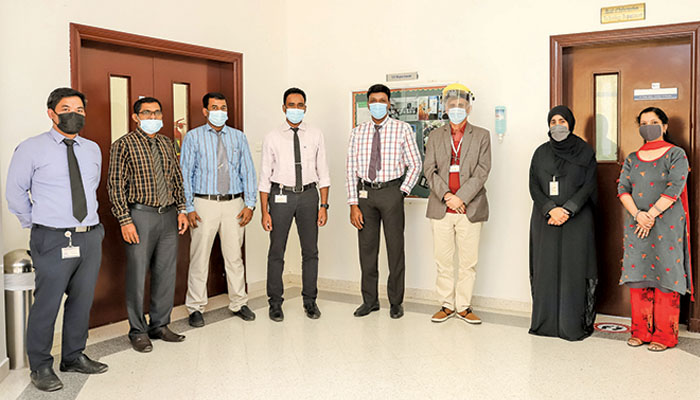
Muscat: A smart mask that detects patient’s temperatures, and programmes that sort COVID admissions on the basis of the severity of symptoms, have been developed by a university in Oman to help the country during the COVID-19 pandemic.
Created by Dr Abraham Varghese and Dr Huda Al Shuaily from the University of Technology and Applied Sciences, the research behind these projects was made possible through funding from the Ministry of Higher Education, Research, and Innovation.
Two separate computer programmes were developed: One determines how far COVID-19 has progressed in patients, with conditions ranging from mild to critical, and the other, on the basis of presenting symptoms, determines the urgency with which patients need to be admitted to intensive care.
Mathematical modelling and machine learning were used to develop the software, which will help optimise patient care and ensure healthcare providers can treat them more efficiently.
“The team formulated a deterministic compartmental model including various stages of infection (such as mild, moderate, severe and critical) to study the spread of COVID-19 and estimated the model parameters by fitting the data of the ongoing pandemic in Oman,” said Varghese.
“It consists of nine nonlinear differential equations that took into account the susceptible individuals, exposed individuals, asymptomatic individuals, the hospitalised individuals, critical individuals and recovered individuals,” he added.
The objectives of the research include developing a mathematical model with different parameters, which fit the numbers of people in various clinical stages in terms of severity, with respect to the available data in Oman. The team came up with a machine learning model to validate a clinical score that will identify potential admittance in an intensive care unit facility for a laboratory-confirmed case of SARS-CoV-2.
“With the machine learning model, the research team has developed a web app called the CoV-19-OM ICU calculator to predict a clinical score that will identify the patients who are likely to be admitted in an intensive care unit,” added Varghese.
“The online web application automates the calculation of the clinical score, which will allow the clinical practitioners to capitalise on the simplicity of the graphical user interface by entering the required values for each variable,” he added.
“It can accelerate better treatment management and facilitate the optimisation of available resources.”
The smart shield developed by the university was created for use by health workers, police officers, firefighters and other first responders who need to be in regular, long-term contact with the public.
“This smart will help to screen those whom we communicate with by detecting their temperature from a distance and thus help keep us safe,” said Varghese.
“When they cross the safe social distancing limit of one metre, the device will provide an indication through an LED display.
“Once the safe distance is breached, the device will calculate the temperature of the person as well,” he explained.
“If the temperature shown is more than 37.5 degree Celsius, the device will issue an indication through an alarm. This will help in reducing the chance of contracting the disease.”
Dr. Varghese and Dr. Al Shuaily aside, the other members of the research team were Dr. Saad Salman Ahmed, Dr. Eduardo M Lacap Jr., Dr. Vinu Sherimon, Shajidmon Kolamban, Jagath Prasad Sreedhar, Syed Rafeek Ahmed, Dr. Faryal Khamis, Dr. Hasina Al Harthi, Dr. Hamed Al Naamani, Dr. Maher Al Bahrani, and Sunil Jacob.